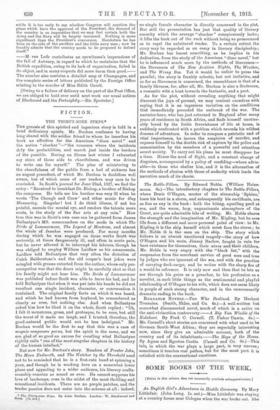FICTION.
THE THIRTY-NINE STEPS.•
THE genesis of this spirited and ingenious story is told in a brief dedicatory epistle. Mr. Buchan confesses to having long shared with the soldier friend to whom he inscribes his book an affection for the American "dime novel" and the native "shocker "—" the romance where the incidents defy the probabilities, and march just inside the borders of the possible. During an illness last winter I exhausted ray store of those aids to cheerfulness, and was driven to write one for myself." The plan of ministering to the cheerfulness of the public from a bed of sickness has an august precedent, of which Mr. Buchan is doubtless well aware, but of which some of our readers may care to be reminded. In Scott's journal for June 22nd, 1827, we find the entry : "Received to breakfast Dr. Bishop, a brother of Bishop the composer. He tells me his brother was very ill when he wrote `The Chough and Crow' and other music for Guy Mannering. Singular! but I do think illness, if not too painful, unseals the mental eye, and renders the talents more acute, in the study of the fine arts at any rate." How true this was in Scott's own case can be gathered from James Ballantyne's MS. memorandum on the mode in which The Bride of Lammermoor, The Legend of Montrose, and almost the whole of Ivanhoe were produced. For many months during which he was engaged on these works Scott was seriously, at times dangerously ill, and often in acute pain, but be never allowed it to interrupt his labours, though he was obliged to employ William Laidlaw as his amanuensis. Laidlaw told Ballantyne that very often the dictation of Caleb Balderstone's and the old cooper's best jokes were mingled with groans extorted from the author, whose only pre- occupation was that the doors might be carefully shut so that his family might not hear him. The Bride of Lammermoor was published before Scott was able to leave his bed, and he told Ballantyne that when it was put into his hands he did not recollect one single incident, character, or conversation it contained. The original family facts on which it was based, and which he had known from boyhood, he remembered as clearly as ever, but nothing else. And when Ballantyne asked him how be liked it on the whole, Scott replied : "Oh, 1 felt it monstrous, gross, and grotesque, to be sure, but still the worst of it made me laugh, and I trusted, therefore, the good-natured public would not be less indulgent." Mr. Buchan would be the first to say that this was a case of magnis componere parva, but the spirit is the same, and we are glad of so good an excuse for recalling what Ballantyne rightly calls "one of the most singular chapters in the history of the human intellect."
But now for Mr. Buchan's story. Readers of Prester Iohn, The Moon Endureth, and The Watcher by the Threshold need not to be reminded that he is a first-rate hand at spinning a yarn, and though he is working here on a somewhat lower plane and appealing to a wider audience, his literary crafts. manship remains as sound as ever. He cannot suppress his love of landscape, even in the midst of the most thrilling and sensational incidents. There are no purple patches, and the tender passion does not enter into the scheme at all : indeed,
• The Thirty-nine Steps. By John Buohan. London= W. Blackwood and Sous. pa, not.] no single female character is directly concerned in the plot, But still the presentation has just that quality of literary amenity which the average " shocker " conspicuously lacks ; it lifts the book out of the ruck without being so pronounced as to repel the unlettered reader. To a certain extent the story may be regarded as an essay in literary discipleship; Mr. Buchan has learnt something, as he implies in his dedication, from the study of the American "dime novel," but he is influenced much more by the methods of Stevenson— the Stevenson of The New Arabian Nights, The Wrecker, and The Wrong Box. Yet it would be unfair to press the parallel; the story is frankly eclectic, but not imitative, and so far as Stevenson is concerned, the resemblance is that of a family likeness, for, after all, Mr. Buchan is also a Scotsman, a romantic with a bent towards the fantastic, and a poet.
As for the plot, without revealing anything that might discount the joys of perusal, we may content ourselves with saying that it is an ingenious variation on the conditiona that immediately preceded the outbreak of the war. The narrator-hero, who has just returned to England after many years of residence in South Africa, and finds himself unutter. ably bored by the futile feverishness of life at home, is suddenly confronted with a problem which exceeds his wildest dreams of adventure. In order to compass a patriotic end of vital importance, be incurs the suspicion of murder, and exposes himself to the double risk of capture by the police and assassination by the members of a powerful and relentless secret society. To carry out his plans he must disappear for a time. Hence the need of flight, and a constant change of disguises, accompanied by a policy of confiding—where advis- able—in those who shelter him, and it is the alternation of the methods of elusion with those of audacity which lends the narrative much of its charm.
















































 Previous page
Previous page